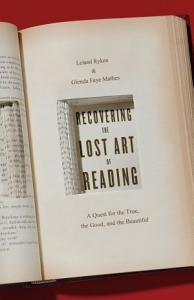Resurrecting Reading


Recovering the Lost Art of Reading: A Quest for the True, the Good, and the Beautiful, Leland Ryken and Glenda Faye Mathes. Wheaton: Crossway, 2021. Softcover, 296 pages.
I grew up with the blessing of books everywhere. For most of my youth I inhabited “the dungeon” — a basement bedroom with no windows, but a full wall of bookshelves. No, my father wasn’t an academic; he was a police officer. He’d completed high school, but didn’t go to university. Nevertheless, his many books filled my room. Even though we always had a TV in the house growing up, I was almost always reading a book. Reading wasn’t only natural, it was delightful. When I was a teenager, I spent hours and hours every week at the local library, about a 30 minute walk from our home.
I wonder what would have happened to me if I’d grown up today rather than in the 1980s. We had TV, but we didn’t have mobile phones. We had cable and a VCR, but we didn’t have Netflix. We had a Commodore 64 computer (with some pretty neat games), but we didn’t have the Internet. So many less distractions back then! It’s a wonder that any kids today still read. Reading is on the rocks – and all ages are affected.
This book seeks to bring reading back from the brink, particularly amongst Christians. Leland Ryken is a retired professor of English and Glenda Mathes is a professional writer. Together they have a passion for not merely helping people to read, but to read excellent literature artfully.
The first part of the book argues the case: “Reading is a Lost Art.” In the second part, Ryken and Mathes explain the different dimensions of literature, including the various genres: stories, poems, novels, fantasy (yes, Harry Potter is discussed), children’s books, and creative non-fiction. This part also includes a chapter on learning to delight in the Bible as literature. The last part of the book discusses what it means to read artfully, with appreciation for the truth, beauty and goodness of literature.
Recovering the Lost Art of Reading will help avid readers become better readers. As it did for me, it may also introduce you to some new authors. This book may also be of interest to budding writers – it certainly gives some insight into how stories are put together.
Unfortunately, Ryken and Mathes did leave me with some unanswered questions, especially in the last part of the book. The authors write, “No good reason exists for immersing ourselves in literature that portrays immoral behaviour and recommends immoral attitudes” (p.184). However, there’s no discussion at all of the one most conspicuous forms of immorality in much literature: blasphemy. What should Christians do with books which take God’s Name in vain? It would have been helpful to explore this elephant-in-the-room question.
There were many good and true things said about beauty in chapter 17. I appreciated the way the authors want to link our understanding of beauty to who God is. Admirably, they want to base their view on what the Bible says, trying to bring some objectivity to bear. However, at the end, they appear to state that what’s beautiful is what gives us pleasure and what employs artistry. Beautiful things do give us pleasure, certainly. But what gives one person pleasure may be nails on a chalkboard to another. I may find pleasure and artistry (and therefore beauty) in an Oscar Peterson jazz composition – but another Christian may listen to it and feel nothing, or worse. I may find pleasure/artistry/beauty in a Marilynne Robinson novel – but another Christian may read it and fail to experience what I did. The authors quote artist Makoto Fujimura on pages 198-99. I decided to look up this artist to see his work. Honestly, I don’t get how his work is beautiful – I get no pleasure from it. Others do. Is it beautiful or not? You see, even though God is objectively beautiful, we struggle to translate what we see in him to how we evaluate literature, art, and music. I can’t escape the conclusion that there may always be something subjective about our notions of beauty and artistry.
A couple of years ago, a colleague wrote an article dealing with the problem of people not reading in the church. The irony is that the people who don’t read probably won’t read it and therefore won’t be challenged or helped. Sadly, something similar could happen with Recovering the Lost Art of Reading. That’s why I’m going to say it’s especially two groups who ought to read this, two groups who can really make a difference. One is English teachers. English teachers can make a difference in encouraging kids to get into a lifetime of reading. The second group is parents who themselves are avid readers. Reading this book will motivate you more to pass on your love for reading to your children. Now, if you’re not in either of those groups, and you just love books, get this one too. It’ll assuredly enhance your appreciation for God’s gift of literature.
Here’s an interview with Leland Ryken about the book:


